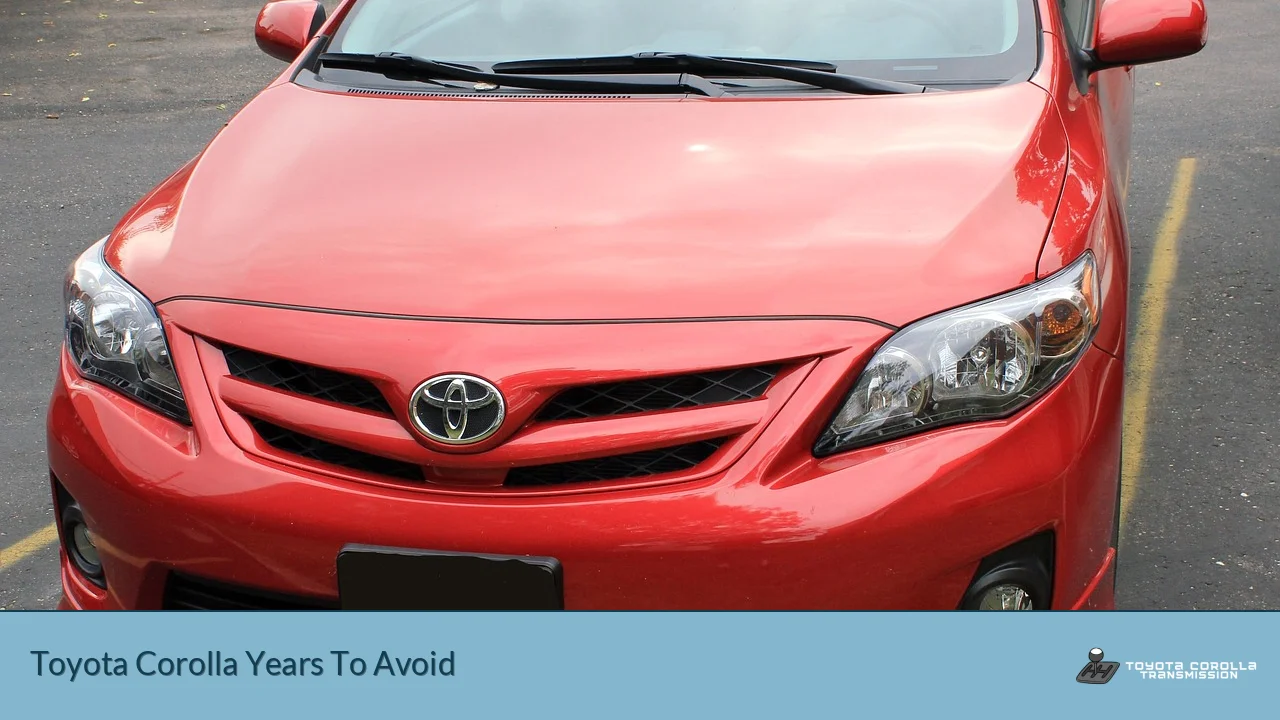When considering the purchase of a used Toyota Corolla, it’s crucial to identify which model years have been associated with significant reliability issues. While the Corolla is widely recognized for its durability and efficiency, certain years have garnered negative feedback from owners due to various problems. This guide will outline the specific years to avoid, highlighting the common issues associated with these models.
| Year | Common Issues |
|---|---|
| 2002 | Excessive oil consumption |
| 2009 | Transmission problems, steering issues |
| 2010 | Steering and braking system problems |
| 2014 | CVT transmission issues |
| 2015 | Unreliable shifting, CVT problems |
| 2016 | Acceleration and shifting issues |
The Toyota Corolla has been an enduring choice for drivers seeking a reliable compact car. However, certain model years have shown a pattern of complaints that potential buyers should be aware of. The most problematic years include 2002, 2009, 2010, 2014, 2015, and 2016. Each of these years has specific issues that can lead to increased maintenance costs and diminished owner satisfaction.
Common Problems in Problematic Years
The issues reported in the problematic model years vary but often include excessive oil consumption, transmission failures, and steering problems. Understanding these common problems can help buyers make informed decisions.
2002 Toyota Corolla
The 2002 model year is notorious for its excessive oil consumption. Many owners report that their engines consume oil at an alarming rate, leading to frequent oil changes and potential engine damage if not addressed promptly. This issue typically arises even in vehicles with relatively low mileage, making it a significant concern for potential buyers.
2009 Toyota Corolla
The 2009 model year faced numerous complaints related to its transmission and steering systems. Drivers reported that the electronic power steering could fail unexpectedly, leading to safety concerns while driving. Additionally, many experienced issues with the transmission, which could lead to costly repairs and reduced vehicle performance.
2010 Toyota Corolla
Similar to the 2009 model, the 2010 Corolla continued to experience steering and braking system problems. Owners reported difficulties with the electronic power steering and brake responsiveness, which could compromise driver confidence and safety on the road.
2014 Toyota Corolla
The introduction of the 11th generation in 2014 brought a fresh design but also significant issues with its continuously variable transmission (CVT). Many owners reported jerky shifting and unusual noises from the transmission, which detracted from the overall driving experience. These CVT problems raised concerns about long-term reliability.
2015 Toyota Corolla
The 2015 model year carried over some of the CVT issues from 2014, resulting in unreliable shifting and occasional stalling. While the car’s design received positive feedback, mechanical problems overshadowed its strengths, making it less appealing for buyers seeking reliability.
2016 Toyota Corolla
Although slightly improved over previous years, the 2016 Corolla still faced complaints regarding acceleration and shifting issues related to its CVT. Owners expressed frustration over repeated visits to dealerships for repairs, impacting their overall satisfaction with the vehicle.
Summary of Issues by Year
To provide a clearer overview of which model years to avoid when considering a used Toyota Corolla, here is a summary table:
| Model Year | Main Issues |
|---|---|
| 2002 | Excessive oil consumption |
| 2009 | Transmission failure, steering problems |
| 2010 | Steering and braking system failures |
| 2014 | CVC transmission issues |
| 2015 | CVC reliability concerns |
| 2016 | Acceleration issues |
By avoiding these specific model years, potential buyers can steer clear of common pitfalls associated with these vehicles.
Conclusion
In conclusion, while many Toyota Corollas are known for their reliability and efficiency, certain model years should be approached with caution or avoided altogether. The years 2002, 2009, 2010, 2014, 2015, and 2016 have been identified as problematic due to various mechanical issues that can lead to increased maintenance costs and owner dissatisfaction.
When shopping for a used Toyota Corolla, it’s essential to conduct thorough research on the specific model year you are considering. By being aware of these problematic years and their associated issues, you can make a more informed decision that aligns with your expectations for reliability and performance.
FAQs About Toyota Corolla Years To Avoid
- Which Toyota Corolla years should I avoid buying as used?
Avoid Toyota Corolla models from 2002, 2009, 2010, 2014, 2015, and 2016 due to common reliability issues. - What are the main problems reported with the Toyota Corolla models from these years?
Main problems include excessive oil consumption in the 2002 model and transmission failures in the 2009-2010 models. - Is it safe to buy a used Toyota Corolla from a problematic year?
No, it’s advisable to avoid these years as they have higher rates of complaints and reliability concerns. - What should I look for when buying a used Toyota Corolla?
Focus on models outside of those identified as problematic or check for service records indicating resolved issues. - Are newer models more reliable than older ones?
Generally yes; newer models tend to have fewer reported problems compared to older generations.
By taking these considerations into account when purchasing a used Toyota Corolla, you can enhance your chances of selecting a vehicle that meets your expectations for reliability and performance.

